In 2020 we recommended the iPad Air 4 over the iPad Pro 11 (2020) countless times, as it offered a similar experience for less cash. But has that changed in 2021?
Apple has announced the iPad Pro 11 (2021), and while it doesn’t have all the eyebrow-raising tech of the 12.9-inch iPad Pro, it does have most of it.
The Apple M1 chipset sits at the top of the pile. This is the same chipset used in MacBook laptops. Y’know, the one that made Intel soil its undergarments because it was so powerful and efficient.
Other disparities include better speakers in the 2021 iPad Pro 11 than the iPad Air 4, a tiny difference to screen size, more cameras in the iPad Pro and 5G. But should that make you spend 150-200 dollars/pounds more? Let’s take a closer look.
Price and availability
The iPad Air 4 is older than the iPad Pro 11 2021. It was announced in September 2020, around seven months before the latest iPad Pro arrived in April 2021.
Initially, the iPad Air 4 seems much cheaper, with a $599 / £579 / AU$899 starting price to the 2021 iPad Pro’s $799 / £749 / AU$1,199, but it’s not quite that simple.
The cheapest iPad Air has 64GB of storage, while the entry-level iPad Pro 11 (2021) spec has 128GB.
It’s fairer then to compare the 256GB specs of both versions (as you can't get the Air with 128GB), which show the real cost difference is slightly less at $150 / £120 / AU$220. However, you will pay more for the cellular upgrade in the iPad Pro 11, because it has 5G rather than 4G.
Here are the iPad Air 4's prices in full so you can see how it scales for yourself:
| Models | US | UK | Australia |
|---|---|---|---|
| 64GB (Wi-Fi) | $599 | £579 | AU$899 |
| 256GB (Wi-Fi) | $749 | £729 | AU$1,129 |
| 64GB (cellular) | $729 | £709 | AU$1,099 |
| 256GB (cellular) | $879 | £859 | AU$1,329 |
And here are the prices for every model of the iPad Pro 11-inch 2021:
| Models | US | UK | Australia |
|---|---|---|---|
| 128GB (Wi-Fi) | $799 | £749 | AU$1,199 |
| 256GB (Wi-Fi) | $899 | £849 | AU$1,349 |
| 512GB (Wi-Fi) | $1,099 | £1,049 | AU$1,649 |
| 1TB (Wi-Fi) | $1,499 | £1,399 | AU$2,249 |
| 2TB (Wi-Fi) | $1,899 | £1,749 | AU$2,849 |
| 128GB (cellular) | $999 | £899 | AU$1,449 |
| 256GB (cellular) | $1,099 | £999 | AU$1,599 |
| 512GB (cellular) | $1,299 | £1,199 | AU$1,899 |
| 1TB (cellular) | $1,699 | £1,549 | AU$2,499 |
| 2TB (cellular) | $2,099 | £1,899 | AU$3,099 |
Design
- Pro 11: 247.6 x 178.5 x 5.9mm, 4 speakers, Face ID, 466g (470g 5G)
- Air 4: 247.6 x 178.5 x 6.1mm, 2 speakers, Touch ID, 458g (460g 4G)
The iPad Air 4 and iPad Pro 11 2021 look very similar. Their outer casings have almost the exact same dimensions. The iPad Pro 11 is 0.2mm thinner, but that is nothing to make your decision over.
Both have the now-standard iPad build. The back and sides are severe-cornered aluminum. Weight is very similar, at 458g for the Wi-Fi iPad Air 4, and 466g for the iPad Pro 11 (2021). The Cellular upgrade adds 2g to the Air, 4g to the Pro – nothing you’d notice.
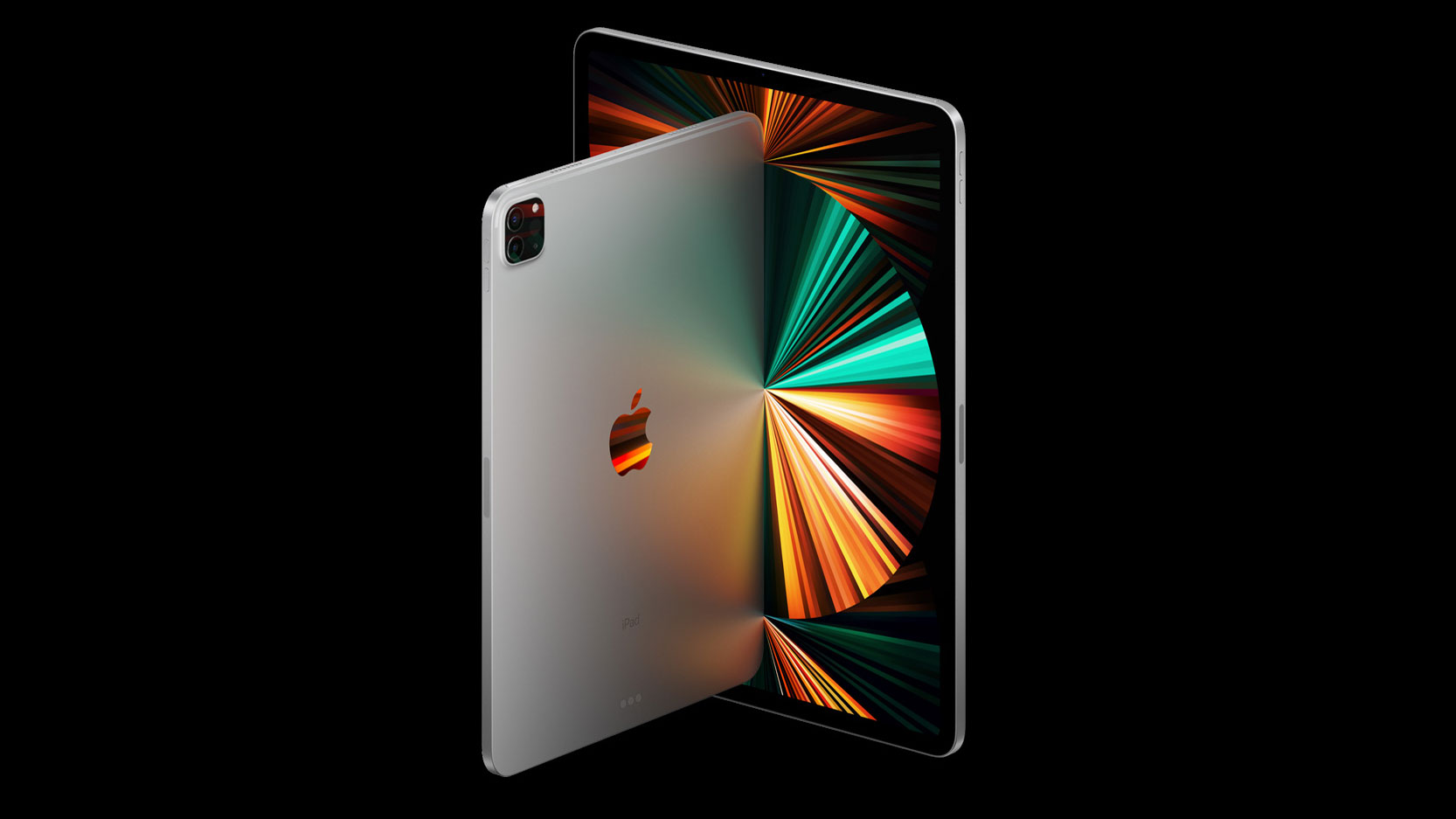
However, where the iPad Air 4 uses a Touch ID fingerprint scanner for secure unlocking, the iPad Pro 11 uses the iPhone-a-like Face ID.
We think the difference in speaker quality is far more important. The iPad Air 4 may have four speaker grilles, but there are only two speaker drivers inside. iPad Pros have four drivers, arranged as a stereo pair. This lets the drivers act a bit like a tweeter/woofer team, one taking responsibility for the lower frequencies. The result is better volume, projection, and dynamic range.
Display
- Pro 11: 11-inch 2388 x 1668, IPS LCD 600 nits, anti-reflective
- Air 4: 10.9-inch 2360 x 1640, IPS LCD 500 nits, anti-reflective
The 2021 iPad Pro brings a generational shift in display tech, but you don’t get it in the 11-inch version.
Apple’s 11-inch iPad Pro 2021 has a more conventional IPS LCD panel, just like the iPad Air 4.
However, its 600-nit brightness is a little better than the Air’s 500-nit panel. Resolution is slightly different too, at 2388 x 1668 to the iPad Air 4’s 2360 x 1640, which allows for the extra 0.1 inches of screen space without trading away pixel density.
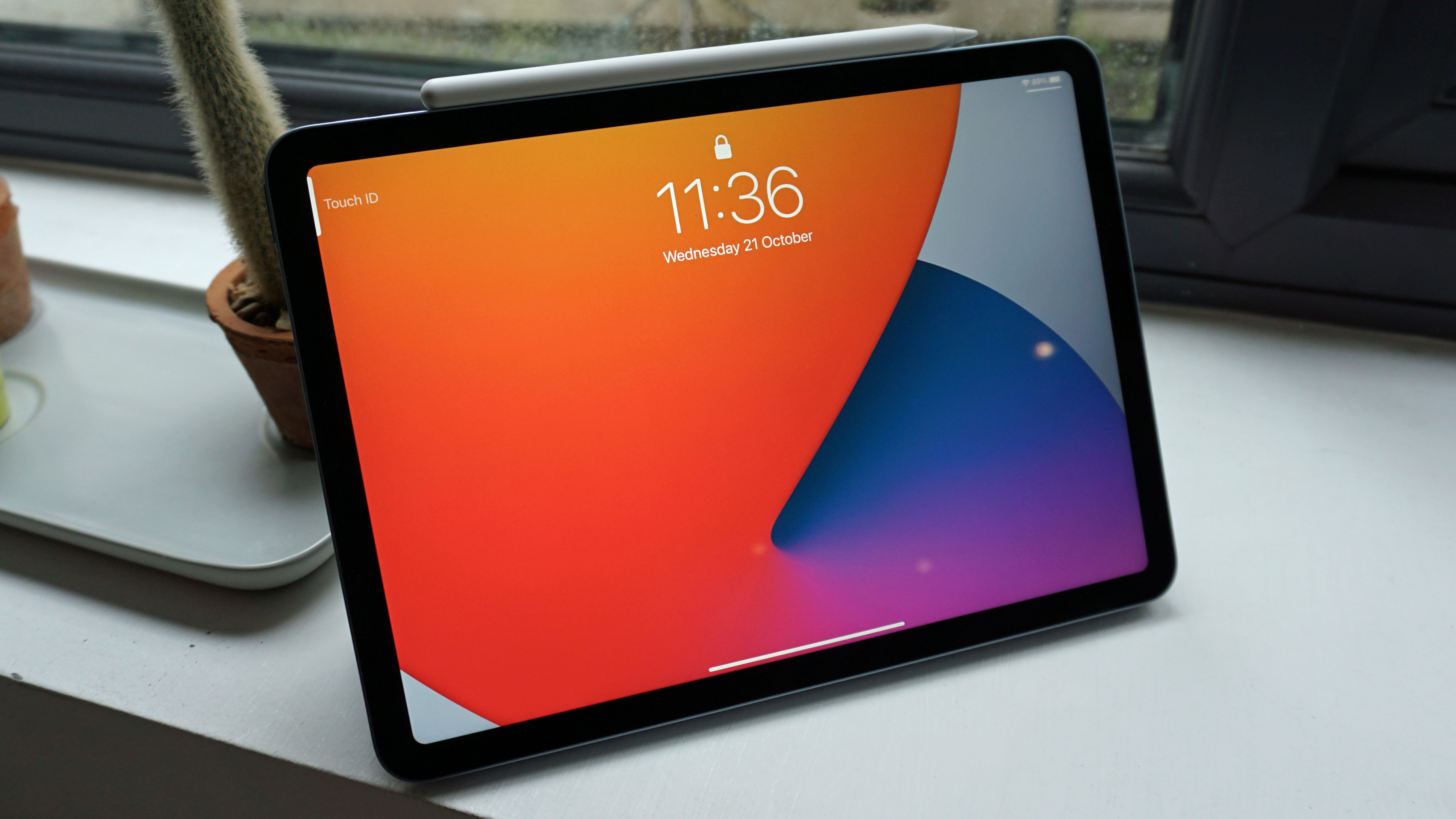
They both also have a layer that helps prevent fingers greasing up the display glass and minimizes reflections.
If you want to experience a next-gen iPad display though you need to spend more.
Apple’s 12.9-inch iPad Pro 2021 has a Mini LED screen, instead of the ‘normal’ LCD used in the iPad Air 4 and iPad Pro 11. This is still a type of LCD, but it uses far smaller backlight LEDs and, in this case, allows for something we’ve never seen in an iPad before.
We’re talking about local dimming. This is a common feature in higher-end TVs, used to make the image look punchier and more contrasty in dimly lit rooms. But all iPads to date including the iPad Pro 11 2021 have not had local dimming — the actual backlight level is consistent across the display.
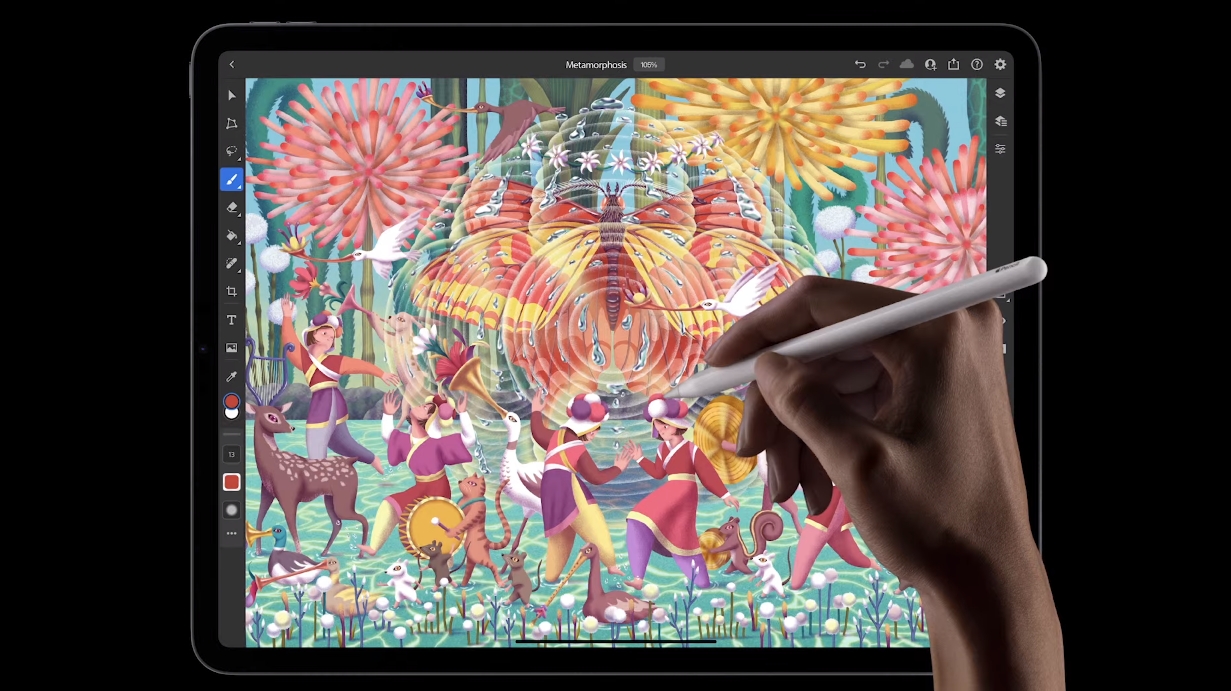
The 2021 iPad Pro 12.9 has around 10,000 local dimming zones, and these are particularly important for HDR video playback. Without local dimming a screen can’t offer an image with contrast above that of the panel’s native contrast, which restricts it quite severely in an LCD screen. As well as that, the 12.9-inch model can also get a lot brighter.
Apple calls this screen tech Liquid Retina XDR, named after its $5000 monitor. So, yeah, you don’t get that in either the iPad Pro 11 or iPad Air 4, but is worth bearing in mind if you are researching a new iPad purchase.
Camera and battery
- Pro 11: 12MP + 10MP rear, 12MP front, 4K/60 rear, 28.65Wh, 10 hours
- Air 4: 12MP rear, 7MP front, 4K/60 rear, 7,606mAh 28.93Wh, 10 hours
Apple says the iPad Pro 11 (2021) has a ‘Pro’ camera array, but the primary camera appears to be the same as the iPad Air 4, as both have a 12MP sensor and an f/1.8 lens.
Both can shoot video at up to 4K resolution, 60 frames per second. And neither is going to take photos as good as those shot on an iPhone 12. As ever, this camera is good ‘for a tablet’.
The iPad Pro 11 has an additional 10MP ultra-wide camera, the kind now so common in phones.
There’s more interesting stuff going on around the front. The iPad Air 4 has the familiar 7MP iPad selfie camera, but the iPad Pro 11 gets a new 12MP ultra-wide one.

It has its figurative eye on video chat, more than just selfies. A feature called Center Stage automatically crops into the image to frame people involved in the chat. Fly solo on a video call and it will pan and zoom as you move around - assuming you hold video chats like someone in a TV advert, multi-tasking and chopping onions at the same time.
We’ve tried a similar feature while testing the Insta360 One R action camera, and found it pretty neat. Apple’s implementation is likely to be smoother, too.
The iPad Pro 2021, like the 2020 generation, also has a LiDAR depth sensor. This is used in AR apps, and to create depth maps for background blur images. The iPad Air doesn’t have one of these cameras.
Battery claims are the same. Apple says, as ever, the iPad Air 4 and 2021 iPad Pro 11 are intended to last up to 10 hours of video streaming over Wi-Fi, or nine hours of web browsing over 4G/5G. The capacity of their batteries is extremely similar too. You get 28.93Wh in the iPad Air 4, 28.65Wh in the 2021 iPad Pro 11.
Specs and features
- Pro 11: M1, Apple Pencil 2nd Gen, Magic Keyboard, Smart Keyboard
- Air 4: A14 Bionic, Apple Pencil 2nd Gen, Magic Keyboard, Smart Keyboard
The iPad Air 4 and iPad Pro 11 (2021) run the same software, but there’s an even bigger difference in power with this generation than normal.
Apple’s Air uses the A14 Bionic chipset seen in the iPhone 12 family. The 2021 iPad Pro tablets use the same Apple M1 processors as the higher-spec version of the MacBook Air.
A look at a few Geekbench 5 scores tells you a lot about their power. An Apple M1 scores around 7,350 points, the iPad Air 4’s A14 Bionic around 4,200 points. They are both excellent chipsets but the Apple M1 is clearly a lot more powerful.
A few games will show off this disparity, like the upcoming Divinity: Original Sin II. But the wider adoption of Apple M1 processors is arguably bigger news for Mac ecosystem gaming as a whole, and is likely to encourage more developers to port their big, fancy games to MacBooks and iPads.
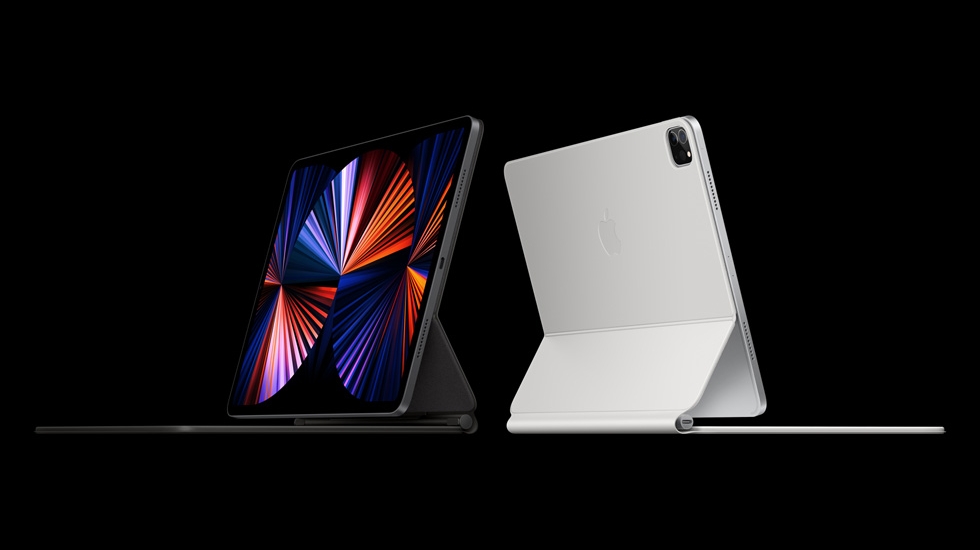
That’s for the future, though, and the iPad Air 4’s own gaming future is pretty secure given it uses the same chipset as all four iPhone 12 phones.
5G is the other big difference between an iPad Air 4 and a 2021 iPad Pro 11. Buy the cellular version of the iPad Air 4 and you get 4G mobile internet. The cellular iPad Pro 11 (2021) has 5G, although the upgrade comes with a big price bump. 5G still does not come cheap.
The USB-C port has changed too in the iPad Pro 11 (2021). It has been upgraded from a USB-C 3.1 connector, as seen in the iPad Air 4, to one that supports Thunderbolt 3 and USB 4. This won’t make a big difference to most of us, but is a nice-to-have extra.
Accessory support remains the same. You can use a 2nd generation Apple Pencil with an iPad Air or Pro, along with a Magic Keyboard or a Smart Keyboard Folio.
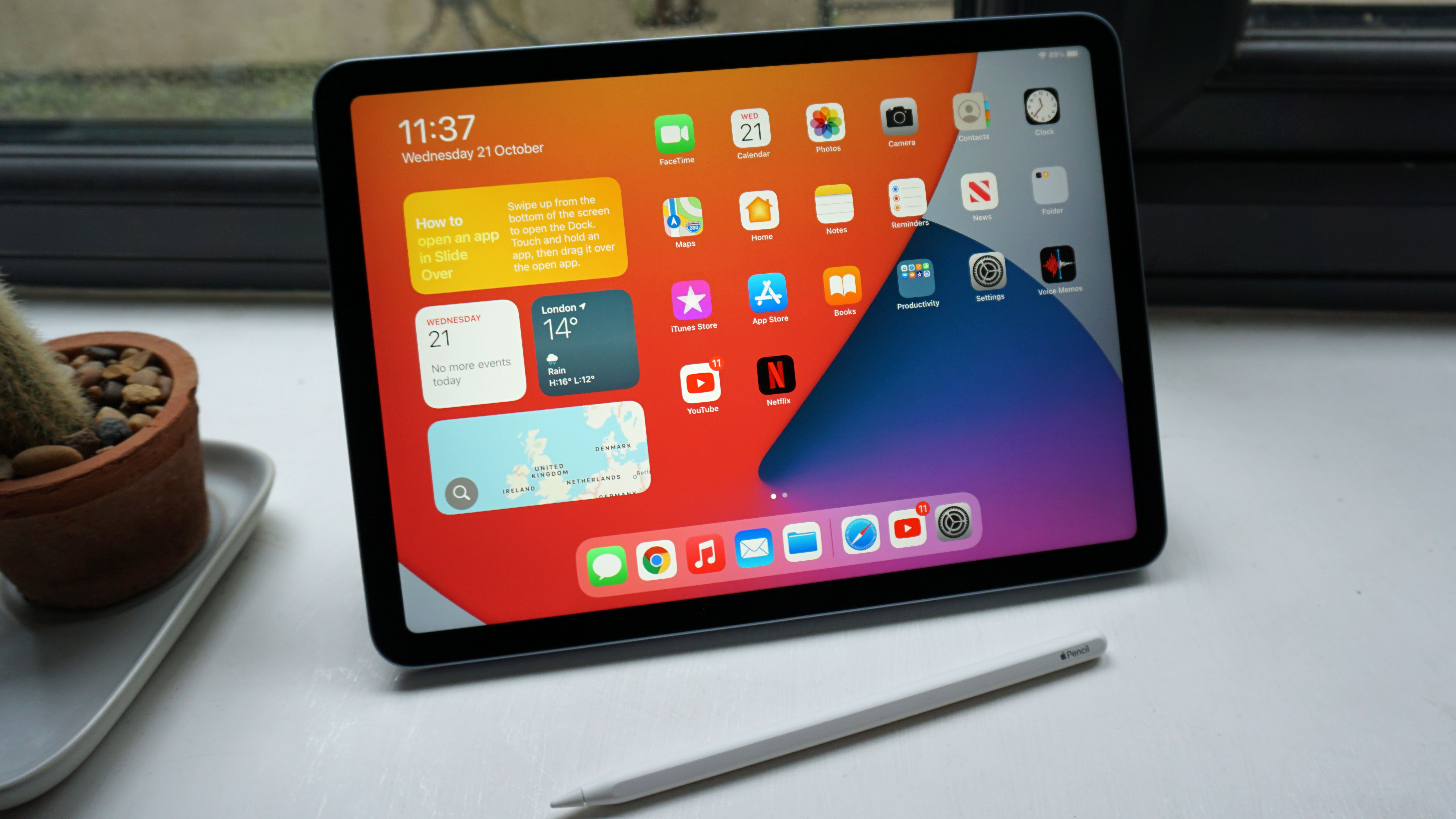
Takeaway
On paper the Apple M1 processor is the most important factor that separates the iPad Air 4 from the 2021 iPad Pro 11. However, quite how impactful it will be for the average tablet buyer really depends on how much M1 is embraced by game developers.
It’s probably worth the extra spend for digital artists who can write a new iPad off as a business expense. but most iPad buyers aren’t professional artists.
Will we suddenly get a load of AAA console ports that you can play on-the-go, without an internet connection, because the Apple M1 is now used on iPads as well as MacBooks? We know Divinity: Original Sin 2 is coming, but that’s not enough to fuel an iPad gaming revolution.
Leave out the crystal ball future-gazing and there are two bits that make us want to consider the upgrade. These are the iPad Pro 11’s superior quad-driver speakers and the clever front cam that will zoom and pan the view to keep you (and other FaceTimers) on-screen.
The 2021 iPad Pro cellular also gets a bump up to 5G. But at $200 / £150 / AU$250 more than the Wi-Fi version this upgrade makes us feel a little queasy, particularly as 5G phones at that price are probably not too far away.
- Grab some of the best iPad games
from TechRadar - All the latest technology news https://ift.tt/3ndnAtw




0 Comments